- Home
- Tim LaHaye
Left Behind Page 18
Left Behind Read online
Page 18
“What’s Chaim’s connection?”
“Nobody’s sure yet, but Carpathia seems to attract experts and consultants who keep him up to speed on technology, politics, finances, and all that. And you know, Buck, he’s not that much older than you are. I think they said this morning he’s thirty-three.”
“Nine languages?”
Plank nodded.
“Do you remember which ones?”
“Why would you ask that?”
“Just thinking.”
Steve pulled a reporter’s notebook from his side pocket. “You want ’em in alphabetical order?”
“Sure.”
“Arabic, Chinese, English, French, German, Hungarian, Romanian, Russian, and Spanish.”
“One more time,” Buck said, thinking.
Steve repeated them. “What’s on your mind?”
“This guy’s the consummate politician.”
“He is not. Trust me, this was no trick. He knew these languages well and used them effectively.”
“But don’t you see which languages they are, Steve? Think about it.”
“Spare me the effort.”
“The six languages of the United Nations, plus the three languages of his own country.”
“No kidding?”
Buck nodded. “So am I gonna get to meet him soon?”
The flight to Atlanta was full and busy, and Rayford had to change altitudes continually to avoid choppy air. He got to see Chloe for only a few seconds while his first officer was in the cockpit and the plane was on autopilot. Rayford made a hurried walk-through but had no time to chat.
He got his wish in Atlanta. Another 747 had to be flown back to Chicago in the middle of the afternoon, and the only other pilot available had to be back earlier. Chicago coordinated with Atlanta, switched the two assignments, and found a seat for Chloe, too. That gave Rayford and Chloe more than two hours for lunch, enough time to get away from the airport.
Their cab driver, a young woman with a beautiful lilt to her voice, asked if they wanted to see “a truly unbelievable sight.”
“If it’s not out of the way.”
“It’s just a couple of blocks from where y’all are going,” she said.
She maneuvered around several detours and construction horses, then through two streets manned by traffic cops. “Over yonder,” she said, pointing, and she pulled into a sandy parking lot rimmed by three-foot concrete-block walls. “Can you see that parking garage ’cross the way?”
“What in the world?” Chloe said.
“Strange, isn’t it?” the cabbie said.
“What happened?” Rayford asked.
“This has been going on since the vanishings,” she said.
They peered at a six-story garage with cars seemingly jammed into each other at all angles in a gridlock so tight and convoluted that cranes worked to lift them out through the open sides of the structure.
“They were all in there after a late ball game that night,” she said. “The police say it was bad anyway, long lines of cars trying to get out, people taking turns merging and lots of ’em not taking turns at all. So some people who got tired of waiting just tried to edge in and make other people let ’em in, you know.”
“Yeah.”
“And then, poof, they say more than a third of the cars ain’t got drivers, just like that. If they had room, they kept going till they hit other cars or the wall. If they didn’t have room, they just pushed up against the car in front of ’em. The ones that were left couldn’t go one way or the other. It was such a mess that people just left their cars and climbed over other cars and went looking for help. They started at dawn moving the cars on the ground levels with tow trucks, then they got them cranes in there by noon, and they been at it ever since.”
Rayford and Chloe sat and watched, shaking their heads. Cranes normally used for hoisting beams up to new buildings were wrapping cables around cars, tugging, yanking, dragging them past each other and through openings in the concrete to clear the garage. It appeared it would take several more days.
“How about you?” Rayford asked the driver. “Did you lose people?”
“Yes, sir. My mama and my grandmama and two baby sisters. But I know where they are. They’re in heaven, just like my mama always said.”
“I believe you’re right,” Rayford said. “My wife and son are gone, too.”
“Are you saved now?” the girl asked.
Rayford was shocked by her forthrightness, but he knew exactly what she meant. “I am,” he said.
“I am, too. You got to be blind or somethin’ to not see the light now.”
Rayford wanted to peek at Chloe, but he did not. He tipped the young woman generously when they got to the restaurant. Over lunch he told Chloe of his history with Hattie, such as it was.
She was silent a long time, and when she spoke her voice was weak. “So you never actually acted on it?” she said.
“Thankfully, no. I never would have been able to live with myself.”
“It would have broken Mom’s heart, that’s for sure.”
He nodded miserably. “Sometimes I feel as bad as if I had been unfaithful to her. But I justified my considering it because your mom was so obsessed with her faith.”
“I know. Funny thing, though. That kept me straighter at school than I might have been otherwise. I mean, I’m sure Mom would be disappointed to know a lot of the things I’ve said and done while I’ve been away—don’t ask. But knowing how sincere and devout she was, and what high hopes and expectations she had for me, kept me from doing something really stupid. I knew she was praying for me. She told me every time she wrote.”
“Did she also tell you about the end times, Chloe?”
“Sure. All the time.”
“But you still don’t buy it?”
“I want to, Dad. I really do. But I have to be intellectually honest with myself.”
It was all Rayford could do to stay calm. Had he been this pseudosophisticated at that age? Of course he had. He had run everything through that maddening intellectual grid—until recently, when the supernatural came crashing through his academic pretense. But like the cabbie had said, you’d have to be blind not to see the light now, no matter how educated you thought you were.
“I’m going to invite Hattie to dinner with us this week,” he said.
Chloe narrowed her eyes. “What, you feel like you’re available now?”
Rayford was stunned at his own reaction. He had to keep himself from slapping his own daughter, something he had never done. He gritted his teeth. “How can you say that after all I’ve just told you?” he said. “That’s insulting.”
“So was what you were hoping for with this Hattie Durham, Dad. Do you think she was unaware of what was going on? How do you think she’ll interpret this? She may come on like gangbusters.”
“I’m going to make it clear what my intentions are, and they are totally honorable, more honorable than they ever could have been before, because I had nothing of worth to offer her.”
“So, now you’re going to switch from hitting on her to preaching at her.”
He wanted to argue, but he couldn’t. “I care about her as a person, and I want her to know the truth and be able to act on it.”
“And what if she doesn’t?”
“That’s her choice. I can only do my part.”
“Is that how you feel about me, too? If I don’t act on it the way you want, you’ll be satisfied that you’ve done your part?”
“I should, but obviously I care much more about you than I do Hattie.”
“You should have thought of that before you risked everything to chase her.”
Rayford was offended again, but he had brought this on himself and felt he deserved it. “Maybe that’s why I never did anything about it,” he said. “Ever think of that?”
“This is all news to me,” she said. “I hope you restrained yourself because of your wife and kids.”
“I almost didn�
��t.”
“So I gather. What if this strategy with Hattie just makes you all the more attractive to her? What’s to keep you from being attracted to her, too? It’s not like you’re still married, if you’re convinced Mom is in heaven.”
Rayford ordered dessert and laid his napkin on the table. “Maybe I’m being naive, but your mother being in heaven is just like losing her to sudden death. The last thing on my mind is another woman, and certainly not Hattie. She’s too young and immature, and I’m too disgusted with myself for having been tempted by her in the first place. I want to be up front with her and see what she says. It’ll be instructive to know whether all this was just in my mind.”
“You mean for future reference?”
“Chloe, I love you, but you’re being bratty.”
“I know. I’m sorry. That was uncalled for. But seriously, how will you know if she tells you the truth? If you tell her you were interested for the wrong reasons and that you aren’t interested anymore, why should she be vulnerable enough to admit she thought you two had possibilities?”
Rayford shrugged. “You may be right. But I have to be honest with her even if she’s not honest with me. I owe her that much. I want her to take me seriously when I tell her what I think she needs now.”
“I don’t know, Dad. I think it’s a little too soon to be pushing her toward God.”
“How soon is too soon, Chloe? There are no guarantees, not now.”
Steve pulled from his breast pocket two sets of press credentials, permitting the bearers to attend Nicolae Carpathia’s speech to the General Assembly of the United Nations that very afternoon. Buck’s credentials were in the name of George Oreskovich.
“Do I take care of you, or what?”
“Unbelievable,” Buck said. “How much time do we have?”
“A little over an hour,” Steve said, rising to hail a cab. “And like I said, he wants to meet you.”
“He reads, doesn’t he? He’s got to think I’m dead.”
“I suppose. But he’ll remember me from this morning, and I’ll be able to assure him it will be just as valuable for him to be interviewed by George Oreskovich as by the legendary Cameron Williams.”
“Yeah, but Steve, if he’s like the other politicians I know, he’s hung up on image, on high-profile journalists. Like it or not, that’s what I’ve become. How are you going to get him to settle for an unknown?”
“I don’t know. Maybe I’ll tell him it’s really you. Then, while you’re with him, I’ll release the report that your obit was wrong and that right now you’re doing a cover-story interview with Carpathia.”
“A cover story? You’ve come a long way from calling him a low-level bureaucrat from a nonstrategic country.”
“I was at the press conference, Buck. I met him. And I can at least gauge the competition. If we don’t feature him prominently, we’ll be the only national magazine that doesn’t.”
“Like I say, if he’s like the typical politician—”
“You can put that out of your mind, Buck. You’re going to find this guy the farthest thing you’ve ever seen from the typical politician. You’re going to thank me for getting you the exclusive interview with him.”
“I thought that was his idea because of my colossal name,” Buck said, smiling.
“So? I could have turned him down.”
“Yeah, and been the executive editor of the only national magazine that fails to cover the most exciting new face to visit the States.”
“Believe me, Buck,” Steve said during the ride to the U.N. building, “this is going to be a refreshing change from the doom and gloom we’ve been writing and reading for days.”
The two used their press credentials to get in, but Buck hung back out of sight of his colleagues and the competition until all were seated in the General Assembly. Steve held a seat for him in the back, where he would not draw attention when he slipped in at the last minute. Meanwhile, Steve would use his cell phone to call in the story of Buck’s reappearance, so it would hit the news by the end of the day.
Carpathia entered the assembly in a dignified yet inauspicious manner, though he had an entourage of a half dozen, including Chaim Rosenzweig and a financial wizard from the French government. Carpathia appeared an inch or two over six feet tall, broad shouldered, thick chested, trim, athletic, tanned, and blond. His thick shock of hair was trimmed neatly around the ears, sideburns, and neck, and his navy-on-navy pinstripe suit and matching tie were exquisitely conservative.
Even from a distance, the man seemed to carry himself with a sense of humility and purpose. His presence dominated the room, and yet he did not seem preoccupied or impressed with himself. His jewelry was understated. His jaw and nose were Roman and strong, his piercing blue eyes set deep under thick brows.
Buck was struck that Carpathia carried no notebook, and he assumed the man must have his speech notes in his breast pocket. Either that or they were being carried by an aide. Buck was wrong on both counts.
Secretary-General Mwangati Ngumo of Botswana announced that the assembly was privileged to hear briefly from the new president of the nation of Romania and that the formal introduction of their guest would be made by the Honorable Dr. Chaim Rosenzweig, with whom they were all familiar.
Rosenzweig hurried to the podium with a vigor that belied his age, and he initially received a more enthusiastic response than did Carpathia. The popular Israeli statesman and scholar said simply that it gave him great pleasure to introduce “to this worthy and august body a young man I respect and admire as much as anyone I’ve ever met. Please welcome His Honor, President Nicolae Carpathia of Romania.”
Carpathia rose, turned to the assembly, and nodded humbly, then shook hands warmly with Rosenzweig. With courtly manners he remained at the side of the lectern until the older man was seated, then stood relaxed and smiling before speaking extemporaneously. Not only did he not use notes, but he also never hesitated, misspoke, or took his eyes off his audience.
He spoke earnestly, with passion, with a frequent smile, and with occasional, appropriate humor. He mentioned respectfully that he was aware that it had not been a full week yet since the disappearance of millions all over the world, including many who would have been “in this very room.” Carpathia spoke primarily in perfect English with only a hint of a Romanian accent. He used no contractions and enunciated every syllable of every word. Once again he employed all nine languages with which he was fluent, each time translating himself into English.
In one of the most touching scenes Buck had ever witnessed, Carpathia began by announcing that he was humbled and moved to visit “for the first time this historic site, where nation after nation has set its sights. One by one they have come from all over the globe on pilgrimages as sacred as any to the Holy Lands, exposing their faces to the heat of the rising sun. Here they have taken their stand for peace in a once-and-for-all, rock-solid commitment to putting behind them the insanity of war and bloodshed. These nations, great and small, have had their fill of the death and maiming of their most promising citizens in the prime of their youth.
“Our forebears were thinking globally long before I was born,” Carpathia said. “In 1944, the year the International Monetary Fund and the World Bank were established, this great host nation, the United States of America, along with the British Commonwealth and the Union of Soviet Socialist Republics, met at the famous Dumbarton Oaks Conference to propose the birth of this body.”
Displaying his grasp of history and his photographic memory of dates and places, Carpathia intoned, “From its official birth on October 24, 1945, and that first meeting of your General Assembly in London, January 10, 1946, to this day, tribes and nations have come together to pledge their wholehearted commitment to peace, brotherhood, and the global community.”
He began in almost a whisper, “From lands distant and near they have come: from Afghanistan, Albania, Algeria . . .” He continued, his voice rising and falling dramatically with the careful pron
unciation of the name of each member country of the United Nations. Buck sensed a passion, a love for these countries and the ideals of the U.N. Carpathia was clearly moved as he plunged on, listing country after country, not droning but neither in any hurry.
A minute into his list, representatives noticed that with each name, someone from that country rose in dignity and stood erect, as if voting anew for peace among nations. Carpathia smiled and nodded at each as they rose, and nearly every country was represented. Because of the cosmic trauma the world had endured, they had come looking for answers, for help, for support. Now they had been given the opportunity to take their stand once again.
Buck was tired and felt grimy, wearing two-day-old clothes. But his worries were a distant memory as Carpathia moved along. By the time he got into the Ss in his alphabetical listing, those standing had begun to quietly applaud each new country mentioned. It was a dignified, powerful thing, this show of respect and admiration, this re-welcome into the global village. The applause was not so loud that it kept anyone from hearing Carpathia, but it was so heartfelt and moving that Buck couldn’t suppress the lump in his throat. Then he noticed something peculiar. The press representatives from various countries were standing with their ambassadors and delegations. Even the objectivity of the world press had temporarily vanished in what they might previously have written off as jingoism, superpatriotism, or sanctimony.
Buck found himself eager to stand as well, ruing the fact that his country was near the end of the alphabet, but feeling pride and anticipation welling up within him. As more and more countries were named and their people stood proudly, the applause grew louder, merely because of the increased numbers. Carpathia was up to the task, his voice growing more emotional and powerful with each new country name.
On and on he thundered as people stood and clapped. “Somalia! South Africa! Spain! Sri Lanka! Sudan! Suriname! Swaziland! Sweden! Switzerland! Syria!”
More than five minutes into the recitation, Carpathia had not missed a beat. He had never once hesitated, stammered, or mispronounced a syllable. Buck was on the edge of his seat as the speaker swept through the Ts and reached “Uganda! Ukraine! The United Arab Emirates! The United Kingdom! The United States of America!” And Buck leaped to his feet, Steve right with him, along with dozens of other members of the press.

 Glorious Appearing: The End of Days
Glorious Appearing: The End of Days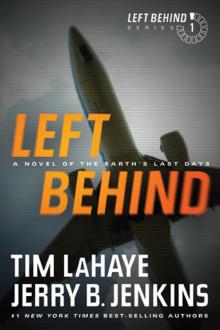 Left Behind: A Novel of the Earth's Last Days
Left Behind: A Novel of the Earth's Last Days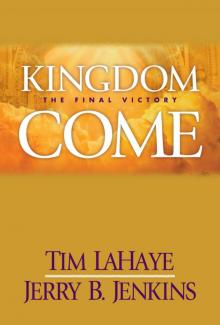 Kingdom Come: The Final Victory
Kingdom Come: The Final Victory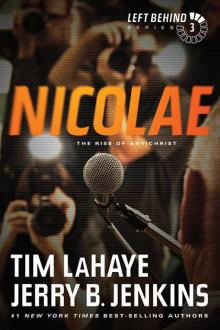 Nicolae: The Rise of Antichrist
Nicolae: The Rise of Antichrist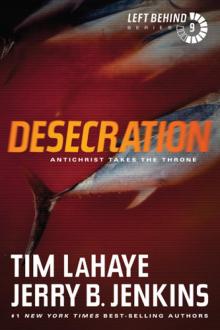 Desecration: Antichrist Takes the Throne
Desecration: Antichrist Takes the Throne Mark's Story: The Gospel According to Peter
Mark's Story: The Gospel According to Peter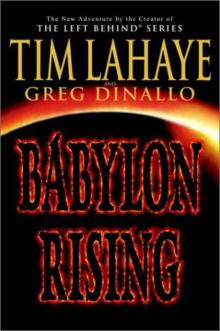 Babylon Rising
Babylon Rising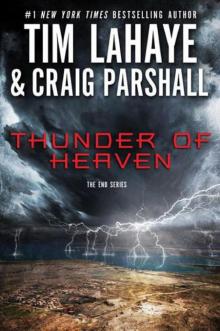 Thunder of Heaven: A Joshua Jordan Novel
Thunder of Heaven: A Joshua Jordan Novel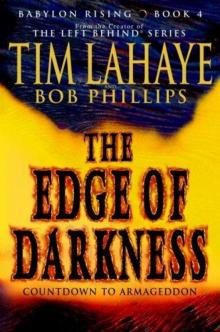 The Edge of Darkness
The Edge of Darkness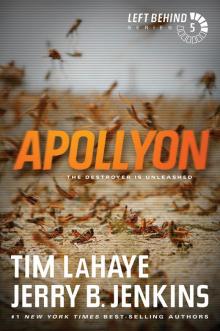 Apollyon: The Destroyer Is Unleashed
Apollyon: The Destroyer Is Unleashed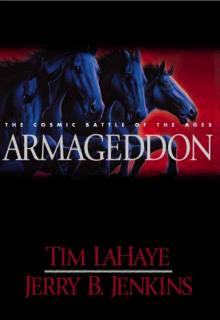 Armageddon: The Cosmic Battle of the Ages
Armageddon: The Cosmic Battle of the Ages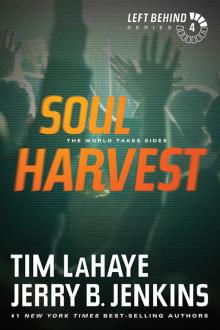 Soul Harvest: The World Takes Sides
Soul Harvest: The World Takes Sides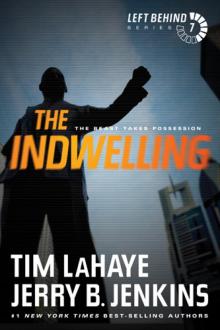 The Indwelling: The Beast Takes Possession
The Indwelling: The Beast Takes Possession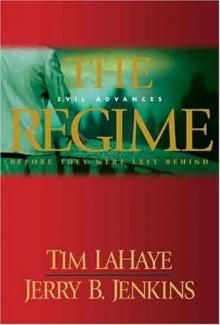 The Regime: Evil Advances
The Regime: Evil Advances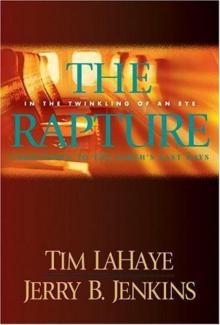 The Rapture: In the Twinkling of an Eye / Countdown to the Earth's Last Days
The Rapture: In the Twinkling of an Eye / Countdown to the Earth's Last Days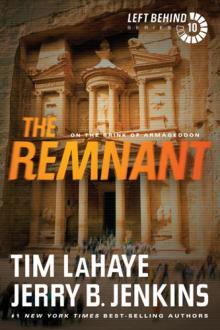 The Remnant: On the Brink of Armageddon
The Remnant: On the Brink of Armageddon John's Story: The Last Eyewitness
John's Story: The Last Eyewitness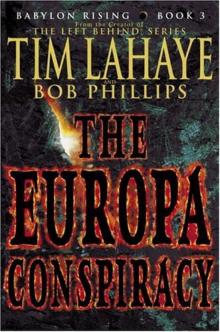 The Europa Conspiracy
The Europa Conspiracy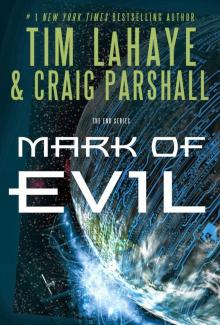 Mark of Evil
Mark of Evil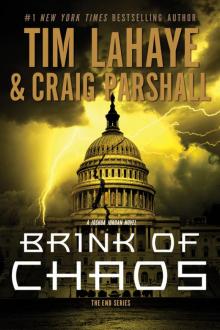 Brink of Chaos
Brink of Chaos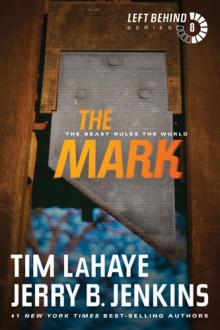 The Mark: The Beast Rules the World
The Mark: The Beast Rules the World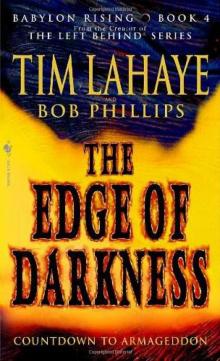 04 The Edge of Darkness
04 The Edge of Darkness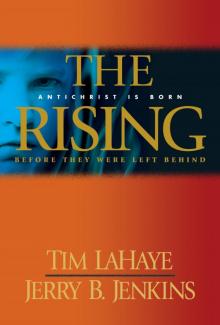 The Rising: Antichrist is Born / Before They Were Left Behind
The Rising: Antichrist is Born / Before They Were Left Behind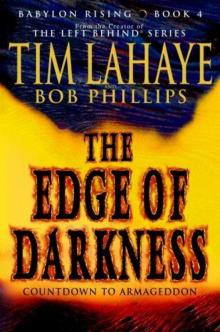 Babylon Rising: The Edge of Darkness
Babylon Rising: The Edge of Darkness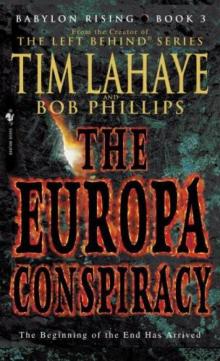 03 The Europa Conspiracy
03 The Europa Conspiracy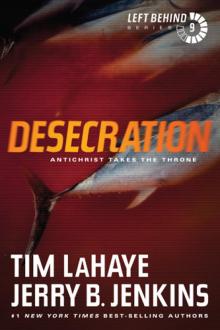 Desecration
Desecration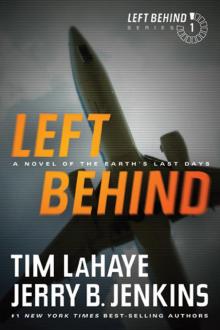 Left Behind
Left Behind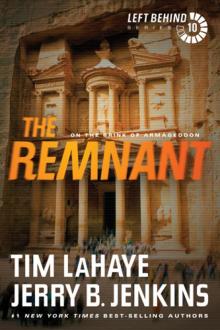 The Remnant
The Remnant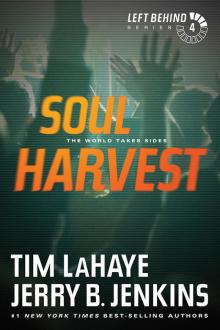 Soul Harvest
Soul Harvest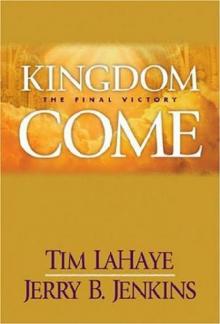 Left Behind Book 13: Kingdom Come The Final Victory
Left Behind Book 13: Kingdom Come The Final Victory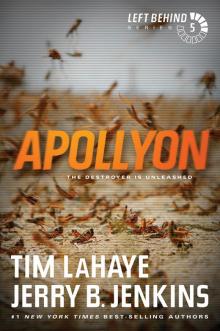 Apollyon
Apollyon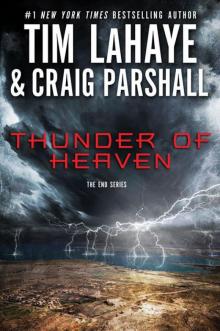 02 Thunder of Heaven: A Joshua Jordan Novel
02 Thunder of Heaven: A Joshua Jordan Novel Glorious Appearing
Glorious Appearing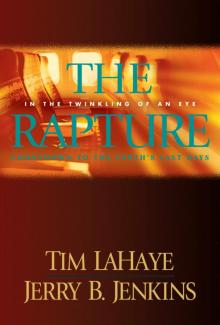 The Rapture: Evil Advances / Before They Were Left Behind
The Rapture: Evil Advances / Before They Were Left Behind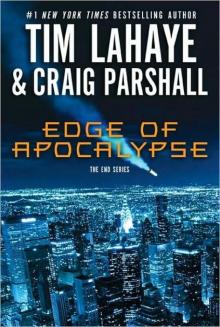 Edge of Apocalypse
Edge of Apocalypse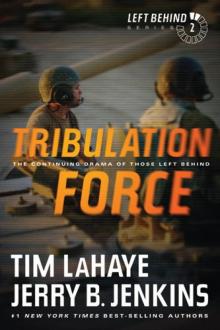 Tribulation Force
Tribulation Force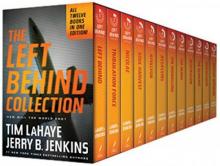 The Left Behind Collection: All 12 Books
The Left Behind Collection: All 12 Books Black Friday
Black Friday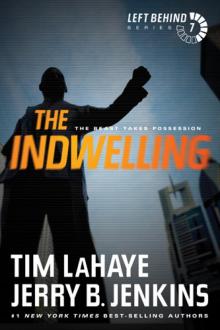 The Indwelling
The Indwelling The Left Behind Collection
The Left Behind Collection